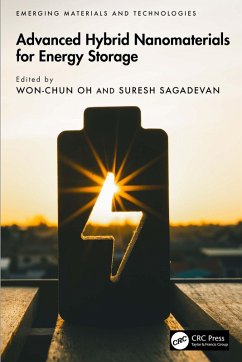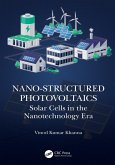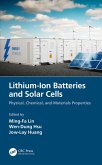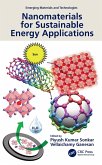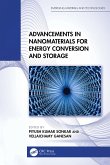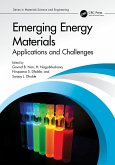Advanced Hybrid Nanomaterials for Energy Storage (eBook, PDF)
Redaktion: Oh, Won-Chun; Sagadevan, Suresh
52,95 €
52,95 €
inkl. MwSt.
Sofort per Download lieferbar

26 °P sammeln
52,95 €
Als Download kaufen

52,95 €
inkl. MwSt.
Sofort per Download lieferbar

26 °P sammeln
Jetzt verschenken
Alle Infos zum eBook verschenken
52,95 €
inkl. MwSt.
Sofort per Download lieferbar
Alle Infos zum eBook verschenken

26 °P sammeln
Advanced Hybrid Nanomaterials for Energy Storage (eBook, PDF)
Redaktion: Oh, Won-Chun; Sagadevan, Suresh
- Format: PDF
- Merkliste
- Auf die Merkliste
- Bewerten Bewerten
- Teilen
- Produkt teilen
- Produkterinnerung
- Produkterinnerung

Bitte loggen Sie sich zunächst in Ihr Kundenkonto ein oder registrieren Sie sich bei
bücher.de, um das eBook-Abo tolino select nutzen zu können.
Hier können Sie sich einloggen
Hier können Sie sich einloggen
Sie sind bereits eingeloggt. Klicken Sie auf 2. tolino select Abo, um fortzufahren.

Bitte loggen Sie sich zunächst in Ihr Kundenkonto ein oder registrieren Sie sich bei bücher.de, um das eBook-Abo tolino select nutzen zu können.
This book explores the groundbreaking field of material design at the nanoscale for next-generation energy storage solutions. It delves into the synthesis, characterization, and optimization, as well as material combinations, of hybrid nanomaterials crafted by combining the advantageous properties of diverse materials.
- Geräte: PC
- mit Kopierschutz
- eBook Hilfe
Andere Kunden interessierten sich auch für
![Advanced Hybrid Nanomaterials for Energy Storage (eBook, ePUB) Advanced Hybrid Nanomaterials for Energy Storage (eBook, ePUB)]() Advanced Hybrid Nanomaterials for Energy Storage (eBook, ePUB)52,95 €
Advanced Hybrid Nanomaterials for Energy Storage (eBook, ePUB)52,95 €![MXenes for Energy Storage Applications (eBook, PDF) MXenes for Energy Storage Applications (eBook, PDF)]() Muhammad RafiqueMXenes for Energy Storage Applications (eBook, PDF)52,95 €
Muhammad RafiqueMXenes for Energy Storage Applications (eBook, PDF)52,95 €![Nano-Structured Photovoltaics (eBook, PDF) Nano-Structured Photovoltaics (eBook, PDF)]() Vinod Kumar KhannaNano-Structured Photovoltaics (eBook, PDF)46,95 €
Vinod Kumar KhannaNano-Structured Photovoltaics (eBook, PDF)46,95 €![Lithium-Ion Batteries and Solar Cells (eBook, PDF) Lithium-Ion Batteries and Solar Cells (eBook, PDF)]() Ming-Fa LinLithium-Ion Batteries and Solar Cells (eBook, PDF)46,95 €
Ming-Fa LinLithium-Ion Batteries and Solar Cells (eBook, PDF)46,95 €![Nanomaterials for Sustainable Energy Applications (eBook, PDF) Nanomaterials for Sustainable Energy Applications (eBook, PDF)]() Nanomaterials for Sustainable Energy Applications (eBook, PDF)52,95 €
Nanomaterials for Sustainable Energy Applications (eBook, PDF)52,95 €![Advancements in Nanomaterials for Energy Conversion and Storage (eBook, PDF) Advancements in Nanomaterials for Energy Conversion and Storage (eBook, PDF)]() Advancements in Nanomaterials for Energy Conversion and Storage (eBook, PDF)54,95 €
Advancements in Nanomaterials for Energy Conversion and Storage (eBook, PDF)54,95 €![Emerging Energy Materials (eBook, PDF) Emerging Energy Materials (eBook, PDF)]() Emerging Energy Materials (eBook, PDF)46,95 €
Emerging Energy Materials (eBook, PDF)46,95 €-
-
-
This book explores the groundbreaking field of material design at the nanoscale for next-generation energy storage solutions. It delves into the synthesis, characterization, and optimization, as well as material combinations, of hybrid nanomaterials crafted by combining the advantageous properties of diverse materials.
Dieser Download kann aus rechtlichen Gründen nur mit Rechnungsadresse in A, B, BG, CY, CZ, D, DK, EW, E, FIN, F, GR, HR, H, IRL, I, LT, L, LR, M, NL, PL, P, R, S, SLO, SK ausgeliefert werden.
Produktdetails
- Produktdetails
- Verlag: Taylor & Francis eBooks
- Seitenzahl: 327
- Erscheinungstermin: 26. Dezember 2024
- Englisch
- ISBN-13: 9781040258958
- Artikelnr.: 72523922
- Verlag: Taylor & Francis eBooks
- Seitenzahl: 327
- Erscheinungstermin: 26. Dezember 2024
- Englisch
- ISBN-13: 9781040258958
- Artikelnr.: 72523922
- Herstellerkennzeichnung Die Herstellerinformationen sind derzeit nicht verfügbar.
Won¿Chun Oh is a Full Professor in the Department of Advanced Materials and Engineering at Hanseo University in Korea and at the School of Materials Science and Engineering at Anhui University of Science and Technology in China. He is a Guest Professor at various other universities throughout China, Thailand, and Indonesia. He obtained the Research Front Award from the Korean Carbon Society, the Yangsong Award from the Korea Ceramic Society, the Excellent Paper Award from the Korea Journal of Material Research, as well as the Best Paper Award from the Journal of Industrial and Engineering Chemistry for his pioneering work. He has also received the Award of Appreciation from ICMMA2011, ICMMA2014, and ICMMA2019. He is an ICMMA Committee Board Member, and from 2007 to the present, he has served as a Conference Chairman and Vice¿Chairman for ICMMA. He has authored or coauthored 806 papers in domestic and international journals, and he currently serves as the Editor¿in¿Chief of the Journal of Multifunctional Materials and Photo Science and the Asian Journal of Materials Chemistry. He is an Advisory Board Member of the Asian Journal of Chemistry and Nanomaterials. Suresh Sagadevan is an Associate Professor at the Nanotechnology and Catalysis Research Centre at the University of Malaya. He has published more than 450 research papers in ISI top¿tier journals and Scopus and has authored 12 international book series and 60 book chapters. He is an Editor, Guest Editor, and Editorial Board Member of many reputed ISI journals and a member of many professional bodies at the national and international levels. He is a recognized reviewer for many reputed journals, and his work spans various fields, such as nanofabrication, functional materials, graphene, polymeric nanocomposite, glass materials, thin films, bioinspired materials, drug delivery, tissue engineering, cell culture, supercapacitor, optoelectronics, photocatalytic, green chemistry, and biosensor applications.
1. Latest Technologies in Solid
State Electrolytes Related to Energy Storage Applications Based on 2D MXenes. 2. TwöDimensional MXenes for Supercapacitor Applications and Prospects. 3. Carbon
Based Hybrid Materials as Advanced Electrodes for Structural Supercapacitors. 4. Carbon Derivatives
Based Silicon as Anode Materials for Lithium
Ion Batteries. 5. Carbon
Based Composites for Energy Storage Applications. 6. Nanomaterials for the Development of Electrodes. 7. Application of Carbon Nanomaterials in Supercapacitors. 8. Development of g
C3N4
Based Nanocomposite for Hydrogen Production and Battery Applications. 9. MXenes
Based Energy Storage Applications: Low
Dimensional Structural Design and Functional Expansion. 10. Application of Nano materials in Electrochemistry. 11. Electric Double
Layer Capacitor Using Carbon Materials. 12. Advanced Hybrid Nanomaterials for Energy Storage.
State Electrolytes Related to Energy Storage Applications Based on 2D MXenes. 2. TwöDimensional MXenes for Supercapacitor Applications and Prospects. 3. Carbon
Based Hybrid Materials as Advanced Electrodes for Structural Supercapacitors. 4. Carbon Derivatives
Based Silicon as Anode Materials for Lithium
Ion Batteries. 5. Carbon
Based Composites for Energy Storage Applications. 6. Nanomaterials for the Development of Electrodes. 7. Application of Carbon Nanomaterials in Supercapacitors. 8. Development of g
C3N4
Based Nanocomposite for Hydrogen Production and Battery Applications. 9. MXenes
Based Energy Storage Applications: Low
Dimensional Structural Design and Functional Expansion. 10. Application of Nano materials in Electrochemistry. 11. Electric Double
Layer Capacitor Using Carbon Materials. 12. Advanced Hybrid Nanomaterials for Energy Storage.
1. Latest Technologies in Solid
State Electrolytes Related to Energy Storage Applications Based on 2D MXenes. 2. TwöDimensional MXenes for Supercapacitor Applications and Prospects. 3. Carbon
Based Hybrid Materials as Advanced Electrodes for Structural Supercapacitors. 4. Carbon Derivatives
Based Silicon as Anode Materials for Lithium
Ion Batteries. 5. Carbon
Based Composites for Energy Storage Applications. 6. Nanomaterials for the Development of Electrodes. 7. Application of Carbon Nanomaterials in Supercapacitors. 8. Development of g
C3N4
Based Nanocomposite for Hydrogen Production and Battery Applications. 9. MXenes
Based Energy Storage Applications: Low
Dimensional Structural Design and Functional Expansion. 10. Application of Nano materials in Electrochemistry. 11. Electric Double
Layer Capacitor Using Carbon Materials. 12. Advanced Hybrid Nanomaterials for Energy Storage.
State Electrolytes Related to Energy Storage Applications Based on 2D MXenes. 2. TwöDimensional MXenes for Supercapacitor Applications and Prospects. 3. Carbon
Based Hybrid Materials as Advanced Electrodes for Structural Supercapacitors. 4. Carbon Derivatives
Based Silicon as Anode Materials for Lithium
Ion Batteries. 5. Carbon
Based Composites for Energy Storage Applications. 6. Nanomaterials for the Development of Electrodes. 7. Application of Carbon Nanomaterials in Supercapacitors. 8. Development of g
C3N4
Based Nanocomposite for Hydrogen Production and Battery Applications. 9. MXenes
Based Energy Storage Applications: Low
Dimensional Structural Design and Functional Expansion. 10. Application of Nano materials in Electrochemistry. 11. Electric Double
Layer Capacitor Using Carbon Materials. 12. Advanced Hybrid Nanomaterials for Energy Storage.
